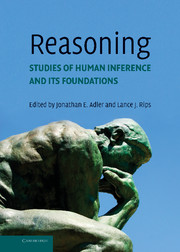37 - Further Notes on Logic and Conversation
Published online by Cambridge University Press: 05 June 2012
Summary
I would like to begin by reformulating, in outline, the position which I took in an earlier article (“Logic and Conversation”). I was operating, provisionally, with the idea that, for a large class of utterances, the total significations of an utterance may be regarded as divisible in two different ways. First, one may distinguish, within the total signification, between what is said (in a favored sense) and what is implicated; and second, one may distinguish between what is part of the conventional force (or meaning) of the utterrance and what is not. This yields three possible elements – what is said, what is conventionally implicated, and what is nonconventionally implicated – though in a given case one or more of these elements may be lacking: For example, nothing may be said, though there is something which a speaker makes as if to say. Furthermore, what is nonconventionally implicated may be (or again may not be) conversationally implicated. I have suggested a Cooperative Principle and some subordinate maxims, with regard to which I have suggested: (i) that they are standardly (though not invariably) observed by participants in a talk exchange; and (ii) that the assumptions required in order to maintain the supposition that they are being observed (or so far as is possible observed) either at the level of what is said – or failing that, at the level of what is implicated – are in systematic correspondence with nonconventional implicata of the conversational type.
Information
- Type
- Chapter
- Information
- ReasoningStudies of Human Inference and its Foundations, pp. 765 - 773Publisher: Cambridge University PressPrint publication year: 2008
Accessibility standard: Unknown
Why this information is here
This section outlines the accessibility features of this content - including support for screen readers, full keyboard navigation and high-contrast display options. This may not be relevant for you.Accessibility Information
- 11
- Cited by
